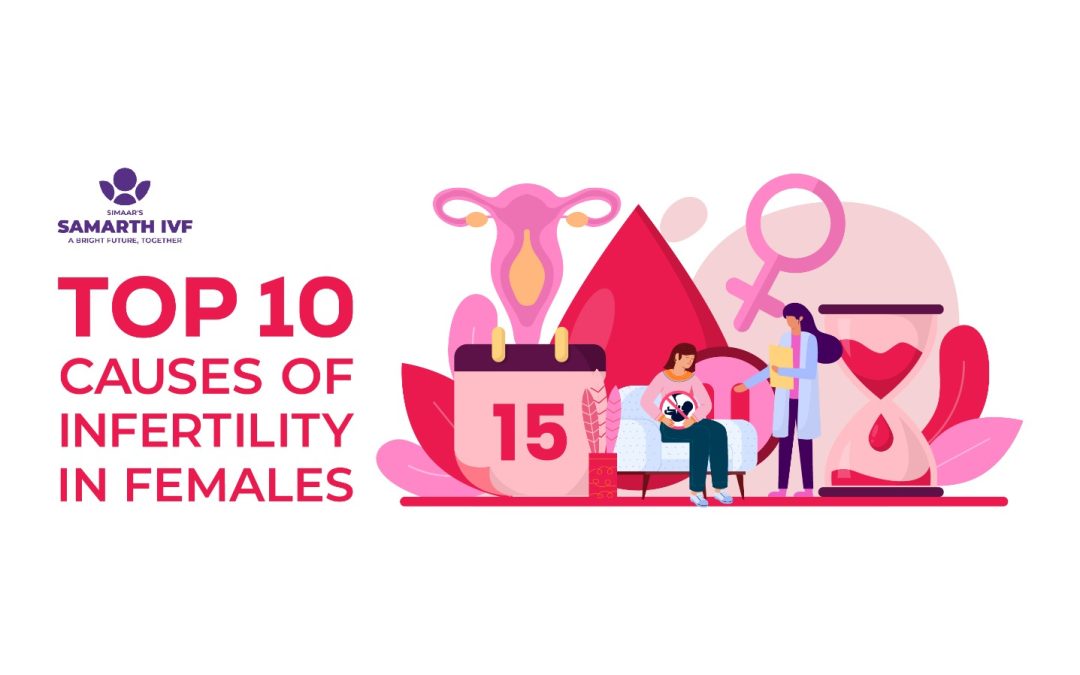Trying to conceive and start a family is a joyful and exciting time for many couples. However, infertility can sometimes become a roadblock on this journey. If you’ve been trying to get pregnant for one year without success (or six months if you’re 35 or older), it’s advisable to consult a fertility specialist.
Understanding the reasons why pregnancy might not be happening can be empowering. Here’s a look at the top 10 causes of infertility in females:
- Ovulation Disorders:
Ovulation is the release of an egg from the ovary each month. Issues with ovulation are a leading cause of infertility in women, affecting around 40% of cases. There are several reasons why ovulation might not occur:
- Polycystic Ovary Syndrome (PCOS): This hormonal imbalance can lead to irregular or absent ovulation.
- Primary Ovarian Insufficiency (POI): Also known as premature ovarian failure, POI is when the ovaries stop functioning normally before age 40.
- Hypothalamic-pituitary Dysfunction: The hypothalamus and pituitary gland play a crucial role in regulating hormones necessary for ovulation.
- Tubal Blockage:
For fertilization to happen, the sperm needs to meet the egg in the fallopian tubes. Blockages in these tubes can significantly hinder this process. Pelvic inflammatory disease (PID), past surgeries, or endometriosis can all contribute to tubal blockages.
- Uterine Fibroids and Polyps:
Fibroids are non-cancerous growths in the uterus, while polyps are benign protrusions on the uterine lining. While not always a cause for concern, these can sometimes affect implantation of a fertilized egg, leading to infertility.
- Endometriosis:
This condition occurs when tissue similar to the uterine lining grows outside the uterus, often on the fallopian tubes, ovaries, or other pelvic tissues. Endometriosis can cause inflammation, scarring, and hormonal imbalances, impacting fertility.
- Cervical Issues:
The cervix is the opening to the uterus. In some cases, physical abnormalities or the presence of hostile cervical mucus can make it difficult for sperm to reach the egg.
- Age:
A woman’s fertility naturally declines with age. This is primarily due to a decrease in the quality and quantity of eggs. While age doesn’t guarantee infertility, it’s a factor to consider, especially for women trying to conceive later in life.
- Lifestyle Factors:
Certain lifestyle choices can influence fertility. These include:
- Weight: Being significantly underweight or overweight can disrupt ovulation and hormonal balance.
- Smoking: Smoking reduces blood flow to the ovaries and damages egg quality.
- Excessive Alcohol Consumption: Heavy alcohol intake can interfere with ovulation and egg health.
- Stress: Chronic stress can affect hormone regulation and ovulation.
- Certain Medical Conditions:
Underlying medical conditions like thyroid disorders, celiac disease, and autoimmune diseases can sometimes impact fertility.
- Past Medical History:
Previous surgeries on the reproductive organs, pelvic infections, or sexually transmitted infections (STIs) can potentially contribute to infertility.
- Unexplained Infertility:
Even after thorough evaluation, sometimes the cause of infertility remains unclear. This is known as unexplained infertility, which affects roughly 10% of couples.
Samarth IVF is a leading fertility clinic dedicated to helping couples achieve their dream of parenthood. Our experienced team can diagnose the cause of your infertility and recommend the most suitable treatment plan.
Contact us today to schedule a consultation and get personalized guidance on your path to a healthy pregnancy.
